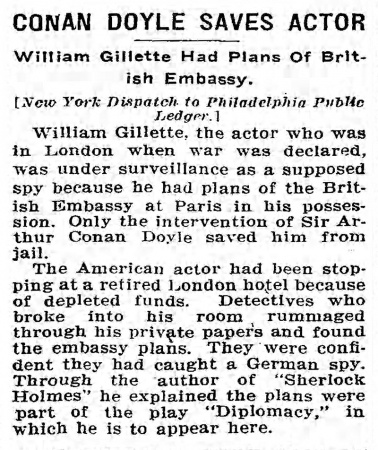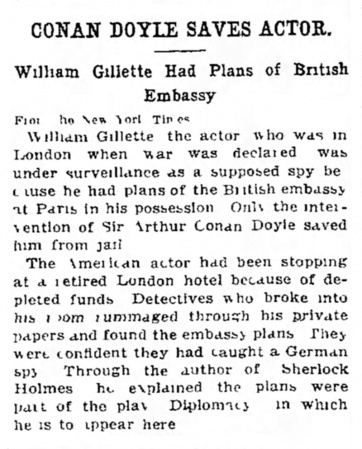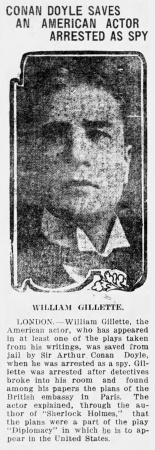William Gillette

William Hooker Gillette (24 july 1853 - 29 april 1937) was an American actor and writer, famous for having played Sherlock Holmes on stage about 1300 times, which rank him on the 3rd place of actors who played Sherlock Holmes the most, beaten by H. Hamilton Stewart (2000 times) and H. A. Saintsbury (1400 times). William Gillette played Sherlock Holmes on stage until 1932 in a play co-created with Conan Doyle, which was an instant success.
In august 1914, in London, Gillette was accused to be a German spy as he had the British embassy plans in his possessions. Scotland Yard was about to arrest the actor, but Arthur Conan Doyle vouched for him. Full details here.
In 1916, he also played the detective in a cinema movie adpated from his play, lost until 2014 when the movie was found in the Cinémathèque archives. He also played Sherlock Holmes on radio, two times: on monday 20 october 1930, The Adventure of the Speckled Band (WEAF-NBC), and 5 few years later (aged 82 years-old) in a 1-hour adaptation of his play on monday 18 november 1935 (New York WABC) with Reginald Mason as Dr. Watson, Betty Hanna as Alice Faulkner and Charles Bryant as professor Moriarty.
William Gillette was guest of honor at the The Baker Street Irregulars diner of 1934.
Theatre
- 1899-1932 : Sherlock Holmes (as Sherlock Holmes)
Cinema
- 1916 : Sherlock Holmes (as Sherlock Holmes)
Radio
- 1930 : The Adventure of the Speckled Band (as Sherlock Holmes)
- 1935 : Sherlock Holmes (as Sherlock Holmes)
Photos
-
Mr. William Gillette as Sherlock Holmes
In Dr. Conan Doyle's popular drama of that name, due at the Lyceum Theatre on sept. 9.
"Why do you villains always choose underground dens for rendezvous?"
[Photo by Sarony, New York]. -
Mr. William Gillette as Sherlock Holmes
In Dr. Conan Doyle's popular drama of that name, due at the Lyceum Theatre on sept. 9.
"Pull down the blinds, Doctor; I don't care to be shot from the street this evening."
[Photo by Sarony, New York].
Articles
- Mr. William Gillette as Sherlock Holmes (The Strand Magazine, december 1901)
William Gillette saved by Conan Doyle
In august 1914, Mr. Gillette had been stopping at the Savoy Hotel in London, where everybody knows him, but because a change better suited him for the work he was doing, one day he moved to the Palais Royal. The latter is a quiet hotel and strangers are uncommon. Perhaps his reserve and his military bearing attracted attention. At any rate, he returned to his room one evening and found the door open. Two men were delving into his portfolios. Enter Mr. Gillette and sits down.
"You live here?" asked one of the detectives.
"yes."
"These are your papers?"
"Were."
"We find among them plans of the British embassy in Paris."
"There are many things among my private papers."
"What are you doing with plans marked 'British embassy at Paris' ?"
"Nothing immediately."
"Then you will come with us to Scotland Yard."
"Just a moment. Although I may look it, I am not a spy. I have played them often. I am an actor. My name is Gillette — William Gillette."
"We don't know you. Is there anybody who can identify you?"
"I am under the management of Charles Frohman. Conan Doyle will vouch for me."
"But how do you come by a plan of the British embassy in Paris?"
"I leave for America to-morrow. I am to appear in a play that you have had here in London for a year. The third act scene is at the British embassy in Paris. In order to get the play correctly on the stage I obtained these drawing of the embassy. The play is 'Diplomacy.' That's all."
But it wasn't. For most of the evening one detective sat with Mr. Gillette while the other telephoned Scotland Yard, whence, in turn, Sir Arthur Conan Doyle was reached at his home in Hindhead. And, sure enough, Sir Arthur "vouched" for Mr. Gillette. Be it therefore recorded that Scotland Yard has discovered William Gillette, for the actor-author was permitted to leave aboard the Baltic next day.
-
The Sun (Baltimore)
(27 august 1914, p. 18) -
The Washington Post
(28 august 1914, p. 6) -
Akron Evening Times
(28 august 1914, p. 10) -
Palladium Item
(31 august 1914, p. 8) -
The Courier Journal
(13 september 1914, p. 44)

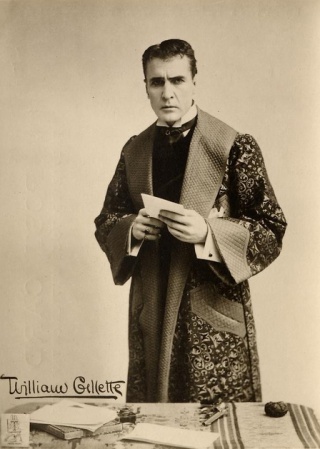


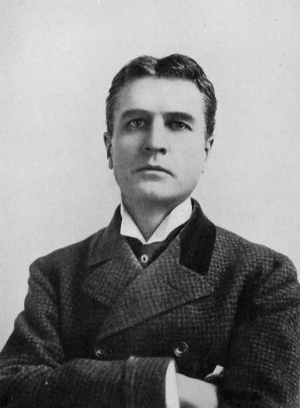

![Mr. William Gillette as Sherlock Holmes In Dr. Conan Doyle's popular drama of that name, due at the Lyceum Theatre on sept. 9. "Why do you villains always choose underground dens for rendezvous?" [Photo by Sarony, New York].](/images/thumb/a/a5/The-sketch-1901-08-21-p192-mr-william-gillette-as-sherlock-holmes-photo.jpg/418px-The-sketch-1901-08-21-p192-mr-william-gillette-as-sherlock-holmes-photo.jpg)
![Mr. William Gillette as Sherlock Holmes In Dr. Conan Doyle's popular drama of that name, due at the Lyceum Theatre on sept. 9. "Pull down the blinds, Doctor; I don't care to be shot from the street this evening." [Photo by Sarony, New York].](/images/thumb/4/42/The-sketch-1901-08-21-p193-mr-william-gillette-as-sherlock-holmes-photo.jpg/446px-The-sketch-1901-08-21-p193-mr-william-gillette-as-sherlock-holmes-photo.jpg)
